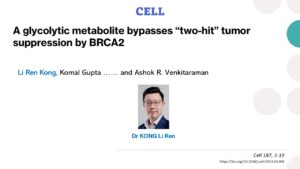
ABSTRACT
Knudson’s “two-hit” paradigm posits that carcinogenesis requires inactivation of both copies of an autosomal tumor suppressor gene. Here, we report that the glycolytic metabolite methylglyoxal (MGO) transiently bypasses Knudson’s paradigm by inactivating the breast cancer suppressor protein BRCA2 to elicit a cancer-associated, mutational single-base substitution (SBS) signature in nonmalignant mammary cells or patient-derived organoids. Germline monoallelic BRCA2 mutations predispose to these changes. An analogous SBS signature, again without biallelic BRCA2 inactivation, accompanies MGO accumulation and DNA dam age in Kras-driven, Brca2-mutant murine pancreatic cancers and human breast cancers. MGO triggers BRCA2 proteolysis, temporarily disabling BRCA2’s tumor suppressive functions in DNA repair and replication, causing functional haploinsufficiency. Intermittent MGO exposure incites episodic SBS mutations without permanent BRCA2 inactivation. Thus, a metabolic mechanism wherein MGO-induced BRCA2 haploinsufficiency transiently bypasses Knudson’s two-hit requirement could link glycolysis activation by onco genes, metabolic disorders, or dietary challenges to mutational signatures implicated in cancer evolution.
Link to full article: https://pubmed.ncbi.nlm.nih.gov/38417710/
